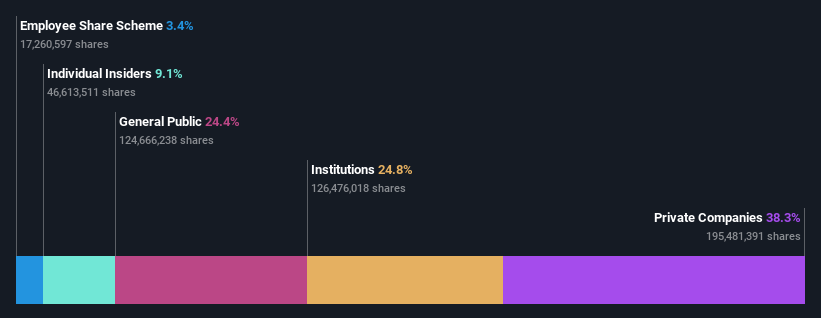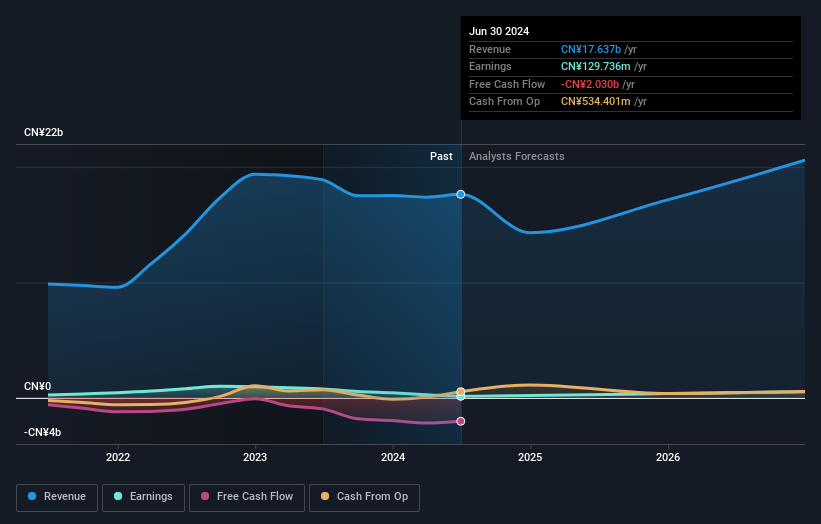Private companies who hold 38% of Wankai New Materials Co., Ltd. (SZSE:301216) gained 22%, institutions profited as well

Key Insights
- The considerable ownership by private companies in Wankai New Materials indicates that they collectively have a greater say in management and business strategy
- The top 4 shareholders own 51% of the company
- Institutions own 25% of Wankai New Materials
If you want to know who really controls Wankai New Materials Co., Ltd. (SZSE:301216), then you'll have to look at the makeup of its share registry. The group holding the most number of shares in the company, around 38% to be precise, is private companies. That is, the group stands to benefit the most if the stock rises (or lose the most if there is a downturn).
Private companies gained the most after market cap touched CN¥6.0b last week, while institutions who own 25% also benefitted.
Let's delve deeper into each type of owner of Wankai New Materials, beginning with the chart below.
View our latest analysis for Wankai New Materials

What Does The Institutional Ownership Tell Us About Wankai New Materials?
Institutions typically measure themselves against a benchmark when reporting to their own investors, so they often become more enthusiastic about a stock once it's included in a major index. We would expect most companies to have some institutions on the register, especially if they are growing.
Wankai New Materials already has institutions on the share registry. Indeed, they own a respectable stake in the company. This suggests some credibility amongst professional investors. But we can't rely on that fact alone since institutions make bad investments sometimes, just like everyone does. If multiple institutions change their view on a stock at the same time, you could see the share price drop fast. It's therefore worth looking at Wankai New Materials' earnings history below. Of course, the future is what really matters.

Hedge funds don't have many shares in Wankai New Materials. Our data shows that Zhejiang Zhink Group Co. Ltd is the largest shareholder with 35% of shares outstanding. Meanwhile, the second and third largest shareholders, hold 6.6% and 5.1%, of the shares outstanding, respectively. In addition, we found that Haijun Xiao, the CEO has 1.5% of the shares allocated to their name.
To make our study more interesting, we found that the top 4 shareholders control more than half of the company which implies that this group has considerable sway over the company's decision-making.
While it makes sense to study institutional ownership data for a company, it also makes sense to study analyst sentiments to know which way the wind is blowing. While there is some analyst coverage, the company is probably not widely covered. So it could gain more attention, down the track.
Insider Ownership Of Wankai New Materials
The definition of company insiders can be subjective and does vary between jurisdictions. Our data reflects individual insiders, capturing board members at the very least. Company management run the business, but the CEO will answer to the board, even if he or she is a member of it.
Insider ownership is positive when it signals leadership are thinking like the true owners of the company. However, high insider ownership can also give immense power to a small group within the company. This can be negative in some circumstances.
We can report that insiders do own shares in Wankai New Materials Co., Ltd.. As individuals, the insiders collectively own CN¥544m worth of the CN¥6.0b company. It is good to see some investment by insiders, but it might be worth checking if those insiders have been buying.
General Public Ownership
The general public-- including retail investors -- own 24% stake in the company, and hence can't easily be ignored. This size of ownership, while considerable, may not be enough to change company policy if the decision is not in sync with other large shareholders.
Private Company Ownership
We can see that Private Companies own 38%, of the shares on issue. It might be worth looking deeper into this. If related parties, such as insiders, have an interest in one of these private companies, that should be disclosed in the annual report. Private companies may also have a strategic interest in the company.
Next Steps:
I find it very interesting to look at who exactly owns a company. But to truly gain insight, we need to consider other information, too. For instance, we've identified 4 warning signs for Wankai New Materials (2 are a bit unpleasant) that you should be aware of.
Ultimately the future is most important. You can access this free report on analyst forecasts for the company.
NB: Figures in this article are calculated using data from the last twelve months, which refer to the 12-month period ending on the last date of the month the financial statement is dated. This may not be consistent with full year annual report figures.
Valuation is complex, but we're here to simplify it.
Discover if Wankai New Materials might be undervalued or overvalued with our detailed analysis, featuring fair value estimates, potential risks, dividends, insider trades, and its financial condition.
Access Free AnalysisHave feedback on this article? Concerned about the content? Get in touch with us directly. Alternatively, email editorial-team (at) simplywallst.com.
This article by Simply Wall St is general in nature. We provide commentary based on historical data and analyst forecasts only using an unbiased methodology and our articles are not intended to be financial advice. It does not constitute a recommendation to buy or sell any stock, and does not take account of your objectives, or your financial situation. We aim to bring you long-term focused analysis driven by fundamental data. Note that our analysis may not factor in the latest price-sensitive company announcements or qualitative material. Simply Wall St has no position in any stocks mentioned.
About SZSE:301216
Wankai New Materials
Engages in the research and development, production, and sale of polyethylene terephthalate (PET) materials.
Adequate balance sheet and fair value.


